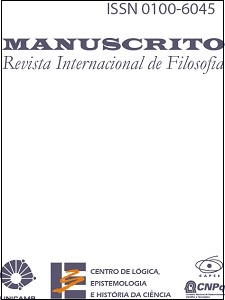Resumen
Las teorías relativistas acerca de las atribuciones de conocimiento sostienen que el valor de verdad de una atribución de conocimiento está determinado por el contexto de evaluación de la atribución. Me ocuparé de dos de las principales críticas que se le han formulado al relativismo. Por un lado, Jason Stanley niega que el relativismo pueda dar cuenta de la factividad del conocimiento. Por otra parte, Manuel García Carpintero sostiene que el relativismo se compromete con una inaceptable imagen sobre las normas que rigen la práctica asertiva. Responderé ambas objeciones. Presentaré primero un modo de dar cuenta de la factividad no evaluado por Stanley. La respuesta a García Carpintero, por su parte, supondrá distinguir en qué sentido la verdad es, y en que otro no es, una norma de la aserción.
Abstract:
Relativist’s theories about knowledge attributions maintain that the truth value of such assertions is partially fixed by the assessment context. I will answer two of the main objections that it has received. On the one side, Jason Stanley denies that relativism can explain the factivity of knowledge. On the other side, Manuel García Carpintero believes that relativism is commited to an unacceptable picture of assertion. The answer to Stanley’s objection involves a way of explaining factivity that he has not evaluated. The answer to García Carpintero involves distinguishing in what way truth is, and in what way it isn’t, a norm of assertion.
Key-words: Relativism. Knowledge. Factivity. Truth. Assertion.
Citas
CAPPELEN, H. “Content Relativism and Semantic Blindness”. Inédito, 2007.
DEROSE, K. “Single scoreboard semantics”. Philosophical Studies, 119, pp. 1-21, 2004.
DRETSKE, F. “Epistemic Operators”. Journal of Philosophy, 67, pp. 1007-1023, 1970.
EGAN, A., HAWTHORNE, J., WEATHERSON, B. “Epistemic Modals in Context”. En: PREYER, G. y PETER, G. (eds.) (2005), pp. 131-168.
EGAN, A., WEATHERSON, B. (eds.). Epistemic Modality. Oxford: Oxford University Press, 2008.
EVANS, G. “Does Tense Logic Rest upon a Mistake?”. In: G. Evans (ed.) (1985), pp. 343-363.
EVANS, G. (ed.). Collected Papers. Oxford: Clarendon Press, 1985.
GARCÍA CARPINTERO, M. “Relativism, Vagueness and What is Said”. Inédito, 2007.
GENDLER-SZABO, T., HAWTHORNE, J. (eds.). The Oxford Guide to Epistemology. Oxford: Oxford University Press, 2005.
GOLDMAN, A.. “Discrimination and Perceptual Knowledge”. Journal of Philosophy, 73, pp. 771-791, 1976 HAWTHORNE, J. Knowledge and Lotteries. Oxford: Oxford University Press, 2004.
HAWTHORNE, J., STANLEY, J. “Knowledge and Action”. Inédito, 2007.
KING, J. “Tense, Modality, and Semantic Values”. Philosophical Perspectives, 17, pp. 195-245, 2003.
KOLBEL, M., GARCÍA CARPINTERO, M. (eds). Relative Truth. Oxford: Oxford University Press, 2007.
KOLBEL, M., “How to Spell Out Genuine Relativism and How to Spell Out Indexical Relativism”. Internacional Journal of Philosophical Studies, 15, pp. 281-288, 2007.
KOLBEL, M. “The Evidence for Relativism”. De próxima aparición en Synthese.
LEWIS, D. “Scorekeeping in a language game”. Journal of Philosophical Logic, 8, pp. 339-359, 1979.
LÓPEZ DE SÁ, D. “Pressupositions of Commonality. An Indexical Relativist Account of Disagreement”. Inédito, 2007a, —————. “The Many Relativisms and the Question of Disagreement”. International Journal of Philosophical Studies, 15, 2, pp. 269-279, 2007b.
MACFARLANE, J. “The Assessment Sensitivity of Knowledge Attributions”. In: T. Gendler-Szabo and J. Hawthorne (eds.) (2005), pp. 197-233.
MACFARLANE, J. “Relativism and Disagreement”. Philosophical Studies, 132, pp. 17–31, pp. 1-25, 2007.
MACFARLANE, J. “Truth in the Garden of Forking Paths”. In: M. Kolbel and M. García Carpintero (eds.) (2007), pp. 117-142.
MACFARLANE, J. “Epistemic Modals are assessment sensitive”. In: A. Egan amd B. Weatherson (eds.) (2008).
MACFARLANE, J. “Nonindexical Contextualism”. De próxima aparición en Synthese.
PREYER, G., PETER, G. Contextualism in Philosophy. Oxford: Oxford University Press, pp. 131-168, 2005.
RICHARD, M. “Contextualism and Relativism”. Philosophical Studies, 119, 1-2, pp. 215-241, 2004.
STANLEY, J. Knowledge and Practical Interest. Oxford: Clarendon Press, 2005.
STANLEY, J. “Precis of Knowledge and Practical Interests”. Inédito, 2007.
WILLIAMSON, T. Knowledge and its Limits. Oxford: Oxford University Press, 2000.

